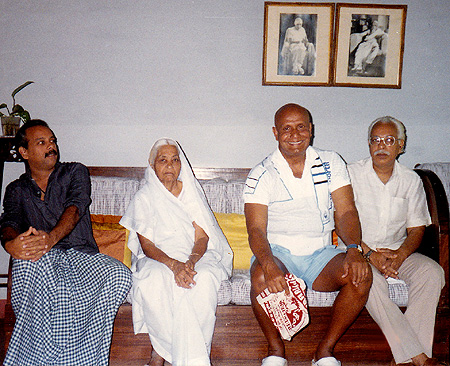The following article by Chinmoy was published in the “Mother India” magazine in August 1963. It is his heartfelt tribute to a revered friend and fellow Ashramite. Narottam Dass Mehra was some twenty-four years older than Chinmoy, but he saw something unique in the young man and he and his entire family became extremely close to Chinmoy. After Narottam’s passing, his son Baburam offered Chinmoy the money for his ticket to the West and for this unconditional gesture of faith in him, Sri Chinmoy was grateful to the end of his days.
– Vidagdha
|
IN MEMORIAM: NAROTTAM DASS MEHRA
“Mother Divine !”— Narottam (meaning “the best of men”) proved all true to his name. Impelled from within he came to Pondicherry from his Calcutta home and had the darshan of Sri Aurobindo and the Mother on August 15, 1950, for the first time. That was the golden moment of his life—a new birth of his soul. Narottam’s old ideal of a successful life merely culminating in a flourishing business changed its entire motive and colour under the direct guidance of the Mother. Then and there his soul, his psychic being, came to the fore and took charge of his career. The Love that ruled all his moments now became his shield against the shafts and arrows aimed at him. The shocks of the world came upon him, but unbowed he stood, unscathed he emerged. His connections with the world were replaced by one all-comprehensive Connection with the Source of that Love, the Mother Divine. His offerings to the Mother knew no reserve, no expectation of return, none of recognition. The Love effaced every dividing line of his personality. His was a single whole of self-dedication. This was the simple picture of the fire-pure change of Narottam. On July 24, a few hours after his demise, the Mother disclosed that his psychic being had clasped her and would not leave. She said also that it was luminous and his next incarnation would be remarkable. On July 27 an inmate of the Ashram wrote to the Mother his vision regarding Narottam’s departure. A part of his vision was that Narottam might have lived for twenty years more had he lived an ordinary life outside the Ashram, free from the stress of the spiritual seeking, but that by throwing himself at the Feet of the Mother he had achieved through her Grace the spiritual progress of twenty coming births. The Mother made a correction, saying, “He would have passed away three years ago had he lived outside.” The disciple is extremely grateful to the Mother that She has made known what would otherwise have remained unknown. Much more grateful is the whole family that they had their dearest one with them for three long years more because of his Ashram life here. Six years before he breathed his last, Mamaji (as Narottam was familiarly called) spoke to me of one of his dreams in which he found himself among a group of people sitting by a burning pyre. Happy and cheerful within, he asked who the dead was. “It is Narottam, who was my life’s support,” said one, heaving a deep sigh. “He was goodness itself for everybody,” said another shedding his tears. “He was a hero of the Divine Mother and died fighting her battle, a hero’s death,” said the third with a broad smile. Deeply moved by this last answer, Mamaji drew close to the man and warmly blessed him. The end of his dream came true at 10.7 a.m. on the 24th July, 1963, shortly after he had entered his fifty-sixth year. CHINMOY |
 |
| This photograph, taken in Pondicherry on 18 January 1989, shows Baburam's brother, Baburam's mother, Sri Chinmoy and Baburam Mehra. |
Notes:
Sri Chinmoy told many stories over the years about this particular family. Here is a small selection:
1. “Baburam is several years younger than me. He was begging me to go to his place. Finally, one day I went with him. As soon as his father saw my eyes, something happened inside him. After that, his father never called me Chinmoy – it was always Yogiraj (king of the yogis).”
2. “When Baburam’s father was very sick in hospital, I went with Baburam to see him. Two doctors came out of the room, smoking. Baburam asked them, “How is he doing?” “Quite well,” they said. I go there and I see the soul is leaving the body. I folded my hands and offered my pranam to Baburam’s father. Then I said to Baburam, “Go and bring the doctors. Your father has left the body.” The doctors did not believe him, but they came. Then they used our Indian system to see if he was alive. If someone is dead and you shake the big toe, the whole body will shake. If they are still alive, the body will not shake. That is our Indian theory. Anyway, they did this and they saw that Baburam’s father was no more. They were so shocked. Not even two minutes before they were saying that he was fine.”
3. “Baburam’s father had a new suit. It was Nehru type. So when Baburam’s mother heard that I was coming to America, she gave it to me. She said her husband would have been so happy for me to have it. On rare occasions I used it in America. When one big shot came to the Indian Consulate, my sectional boss, C.G.K. Menon, asked me to give it to him to wear to the function. Every day at 4:30 I used to stand in front of this particular boss and say, ‘I am now going to the post office.’ One day he said to me, ‘Why are you wasting your time here?’ Then he was so happy when I left the Consulate to do my spiritual work.”
